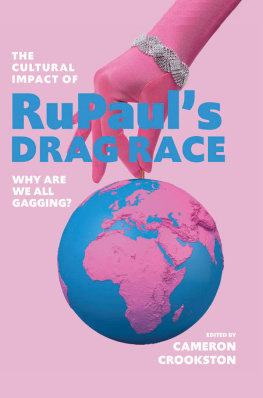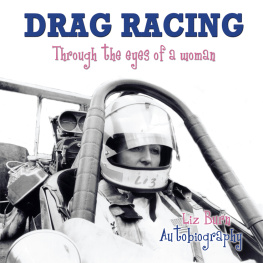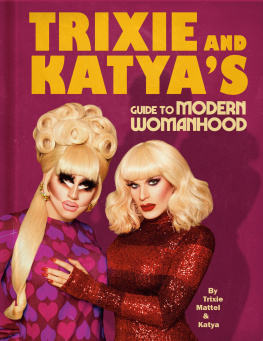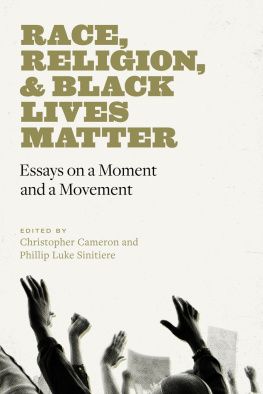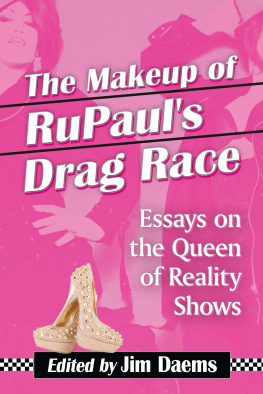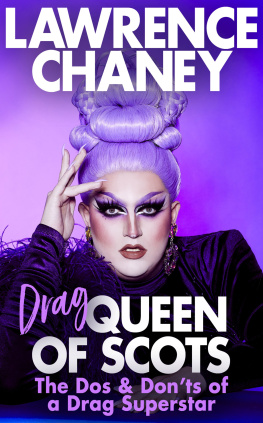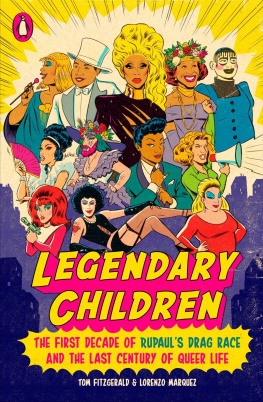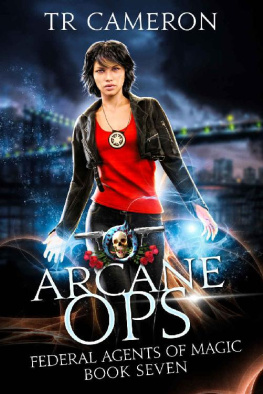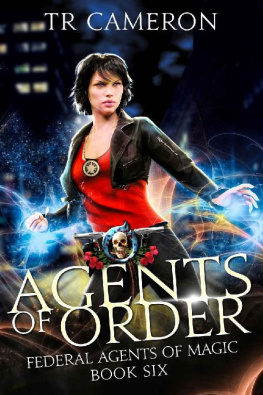The Cultural Impact of RuPauls Drag Race
The Cultural Impact of RuPauls Drag Race
Why Are We All Gagging?
E DITED BY
Cameron Crookston
First published in the UK in 2021 by
Intellect, The Mill, Parnall Road, Fishponds, Bristol, BS16 3JG, UK
First published in the USA in 2021 by
Intellect, The University of Chicago Press, 1427 E. 60th Street,
Chicago, IL 60637, USA
Copyright 2021 Intellect Ltd
All rights reserved. No part of this publication may be reproduced, stored in a retrieval system, or transmitted, in any form or by any means, electronic, mechanical, photocopying, recording, or otherwise, without written permission.
A catalogue record for this book is available from the British Library.
Copy editor: Newgen KnowlegdeWorks
Cover designer: Holly Rose
Production manager: Aime Bates
Typesetting: Newgen KnowledgeWorks
Print ISBN 978-1-78938-256-3
ePDF ISBN 978-1-78938-257-0
ePub ISBN 978-1-78938-258-7
To find out about all our publications, please visit www.intellectbooks.com
There you can subscribe to our e-newsletter, browse or download our current catalogue, and buy any titles that are in print.
This is a peer-reviewed publication.
Contents
Cameron Crookston
Joshua W. Rivers
Ash Kinney dHarcourt
Lwando Scott
K. Woodzick
Aaron J. Stone
Mario Campana and Katherine Duffy
Ray LeBlanc
Laura Friesen
Allan S. Taylor
Timothy Oleksiak
Carl Schottmiller
I wish to extend my gratitude to the team at Intellect for supporting this book and encouraging me through its development. In particular I wish to thank James Campbell, Katie Evans, Naomi Curston, and Aime Bates for their support and guidance. I would also like to thank Professors Jacob Gallagher-Ross and VK Preston at the University of Toronto for their good counsel and sound advice on editing. To the group of scholars who contributed to this book, I offer my most sincere thanks for your hard work. Finally, I wish to thank the artists, both those named in this book and those unnamed, whose work contributes to the vibrant and expansive world of drag.
Cameron Crookston
Since its premier in 2009, RuPauls Drag Race has captured the attention and imagination of fans. Drag Race has spawned conventions and international spin-off programs and transformed not only the careers of its over one hundred contestants but also the very landscape of drag performance itself. In addition to the enthusiasm and critical acclaim the show has gained from fans and critics, Drag Race has become the subject of scholarship and academic analysis around the world. Over the past decade Drag Race has been the subject of articles and essays in publications such as Studies in Popular Culture (Edgar ). The Cultural Impact of RuPauls Drag Race: Why Are We All Gagging? joins a conversation that has evolved over ten years in response to a show that has itself grown and changed as the very subject it documents, the art and world of drag, has been transformed radically.
The seed of this project was born when I participated in a roundtable discussion on contemporary drag performance at Q2Q: A Symposium on Queer Theatre and Performance in Canada, held at Simon Fraser University, in 2016. Seated between drag performers Isolde N. Barron and Rose Butch the conversation turned to recent changes and influences in local drag communities across Canada. Barron discussed her experience of marathon drag in Toronto, a fairly recent phenomena in which rather than preparing two or three numbers to perform in a contained single show, queens were expected to perform over a dozen numbers, for hours, with shows running virtually nonstop from opening to closing. Increases in straight audience members and higher numbers of aspiring performers were also noted as major changes to drag in the second decade of the twentieth century, all of which could be traced to the popularity and proliferation of RuPauls Drag Race. Audiences who might have never wandered into a bar to discover drag were having it piped into their living rooms. Queer youth who would have had to wait another decade or move to a larger city could access drag earlier and more easily. Even for those who did not actively seek out the program, Drag Race spawned memes, viral catch phrases, hashtags, Saturday Night Live sketches, and spin-off series. As such, drag audiences changed. They grew in size and in demographic diversity. They experienced drag via television first and brought those expectations to local live shows. And through this all, Drag Race continued to grow.
Initially, I conceived of this collection as a volume in Intellects Fan Phenomena series. I was interested in exploring Drag Races transition from cult program to mainstream hit and bringing scholarly attention to events such as DragCon, the trend of viewing parties at local bars around the world, and the unique way that Drag Race performers related to their fans via social media. However, as I worked with Intellect, we quickly decided that while fan culture was a part of this discussion, there was much more going on and that it warranted a broader scope than merely an analysis of fan studies. So we put out a call for the collection as it stands, a project that asked scholars to reflect on the impact Drag Race has had on the world around us. I asked, with a wink and a nod that seemed appropriate within the context of drag studies: why are we all gagging? What is the cultural impact of RuPauls Drag Race?
I received submissions from scholars in theater and performance studies, English literature, and cultural anthropology. From media studies, linguistics, sociology, and marketing. These chapters provided a rich and diverse engagement with the question of how Drag Race has affected local live cultures, fan cultures, queer representation, and the very fabric of drag as an art form in popular consciousness. The result is this collaborative project informed by the research and experience of scholars and fans, who have each contributed unique cultural, academic, and often personal perspectives on my question about the cultural impact of RuPauls Drag Race.
The Cultural Context of RuPauls Drag Race
The turn of the twenty-first century witnessed an explosion of reality programing). Because of drags very foundation of cultural parody and self-referential construction of realness, Drag Race offered what many critics and scholars saw as the perfect platform to parody the popular form at a moment in the zeitgeist when audiences had had enough time to become critically aware of the constructed nature, and thus the ironic lack of reality, of reality television. Marcel, among others, observes the degree to which RuPauls vision for the show, at least in the early seasons, presented a parody of reality TV conventions.
However, despite the subversive potential that Drag Races parody of reality television might have offered, critics and scholars almost immediately spotted the danger of adapting a queer art form for mass cultural consumption. Articles that cautioned against the pitfalls of



